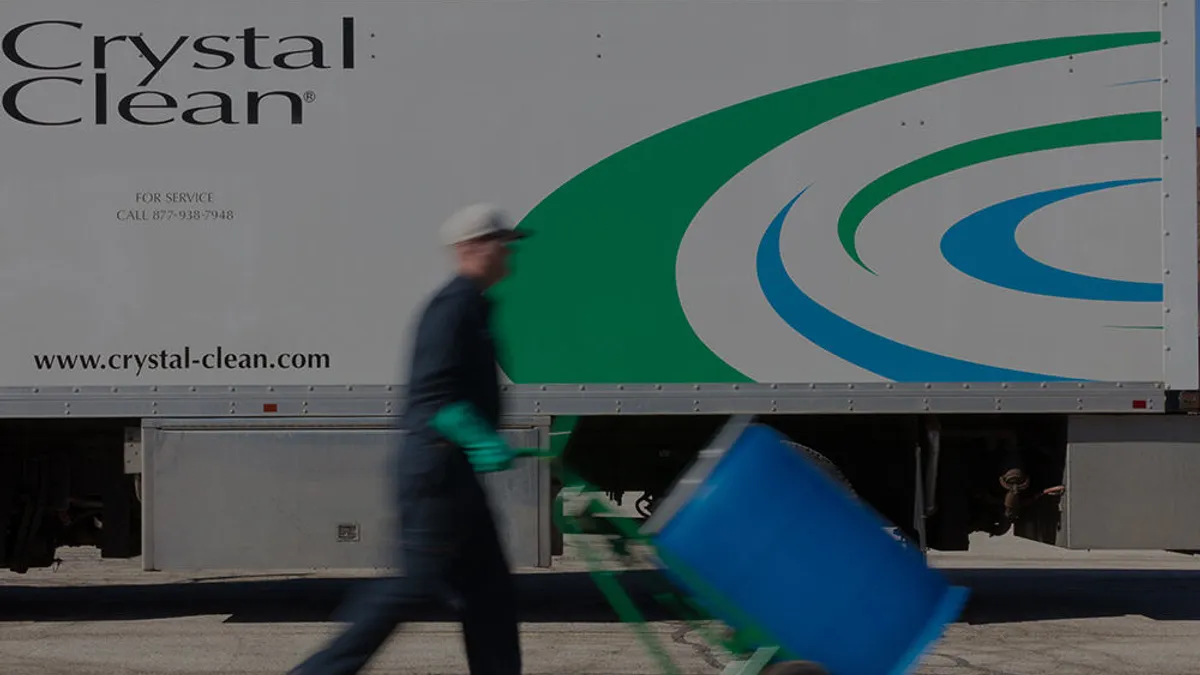Dive Brief:
- Heritage-Crystal Clean will pay more than $1.16 million in civil penalties and implement numerous compliance measures for violating hazardous waste regulations, the U.S. EPA and U.S. Department of Justice announced Thursday.
- The company, a provider of hazardous and non-hazardous waste services, improperly managed certain solvents at “current or former” HCC facilities. Those facilities are located in communities that face “environmental justice concerns” in Indiana, Louisiana, Georgia, Pennsylvania and Colorado, the EPA says.
- The proposed settlement would restrict some HCC facilities from treating, storing or disposing of certain kinds of parts-washing solvents that qualify as hazardous waste “unless and until” the company receives relevant permits, among other compliance requirements. Implementing the compliance measures could cost at least $1.63 million, the EPA estimates.
Dive Insight:
The settlement comes just months after Heritage-Crystal Clean went private after being acquired by an affiliate of private equity firm J. F. Lehman & Co. in a $1.2 billion deal. The deal was announced in July and finalized in October.
Heritage-Crystal Clean, launched in 1999, describes itself as the second-largest North American provider of hazardous and non-hazardous waste services, as well as parts cleaning and used oil collections services. The company also offers a PFAS remediation program for landfills and industrial waste treatment markets, according to its website.
The Louisiana Department of Environmental Quality and the state of Indiana first brought forth numerous complaints related to HCC’s operations in January 2022. The 21-count complaint stated that HCC accepted and managed some used parts-washing solvents for disposal that qualified as hazardous waste but were not managed appropriately under the Resource Conservation and Recovery Act.
The complaint stated that HCC transported the hazardous waste without required hazardous waste manifests, stored it without required permits and mixed together used solvents from different parts-washing customers. It also “failed to comply with certain requirements for reducing air emissions from certain hazardous waste tanks and equipment,” according to a statement from the EPA. HCC is alleged to have “evaded hazardous waste requirements by improperly claiming that the unusable solvents were products instead of wastes,” the agency added.
“Companies that manage hazardous wastes for other companies are required to ensure that those wastes are handled properly, which Heritage Crystal Clean repeatedly failed to do,” said David Uhlmann, assistant administrator for EPA’s Office of Enforcement and Compliance Assurance, in the statement.
Heritage-Crystal did not respond to a request for comment.
The proposed settlement calls for HCC to comply with numerous measures at “multiple” HCC facilities. That settlement is subject to a 30-day federal public comment period and approval by the U.S. District Court for the Northern District of Illinois.
If the settlement is approved, HCC will need to ensure that a specific type of solvent it uses is “acceptable for re-use without prior reclamation and that it is legitimately reused.” It would also prohibit HCC from using gravity separation to meet resale specifications. HCC would also need to remove another type of solvent from its facilities if it “exhibits hazardous waste characteristics.”
The proposed settlement also requires HCC to apply for a RCRA permit at its Indianapolis facility, and frequently inspect tanks and containers in the meantime. Other requirements call for HCC to distribute educational materials to some of its parts-washing customers and find a third party to audit certain facilities to make sure the company stays in compliance, the EPA said.
The complaint names five specific HCC facilities the EPA says are in communities with potential environmental justice concerns. Facilities in Atlanta, Denver and Indianapolis are named, as well as ones in Shreveport, Louisiana and Fairless Hills, Pennsylvania. The EPA says the settlement will help HCC implement improved work practices that will “reduce emissions of volatile organic compounds (VOCs) and reduce risk of exposure to hazardous wastes managed at these facilities.”
“EPA is committed to fair and robust enforcement of our hazardous waste laws to ensure that our communities and the environment are protected from mismanaged hazardous wastes,” Uhlmann said in the statement.















